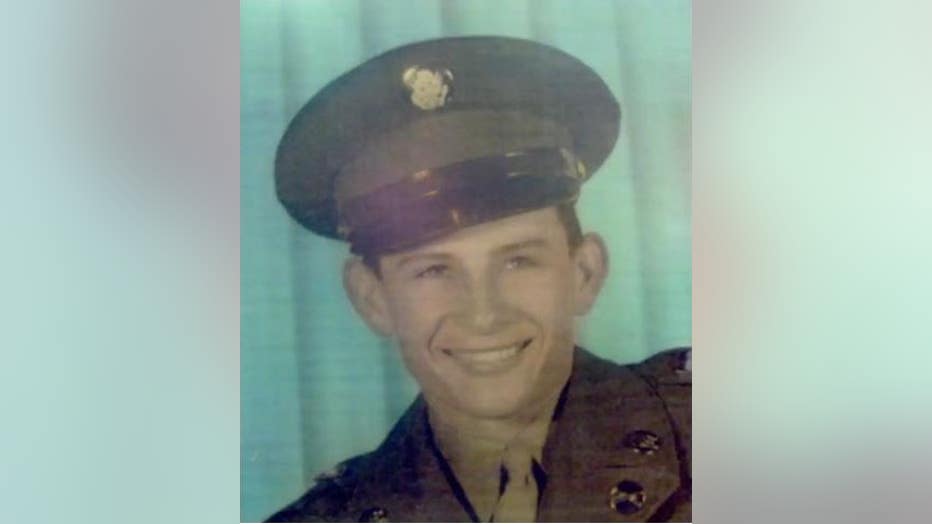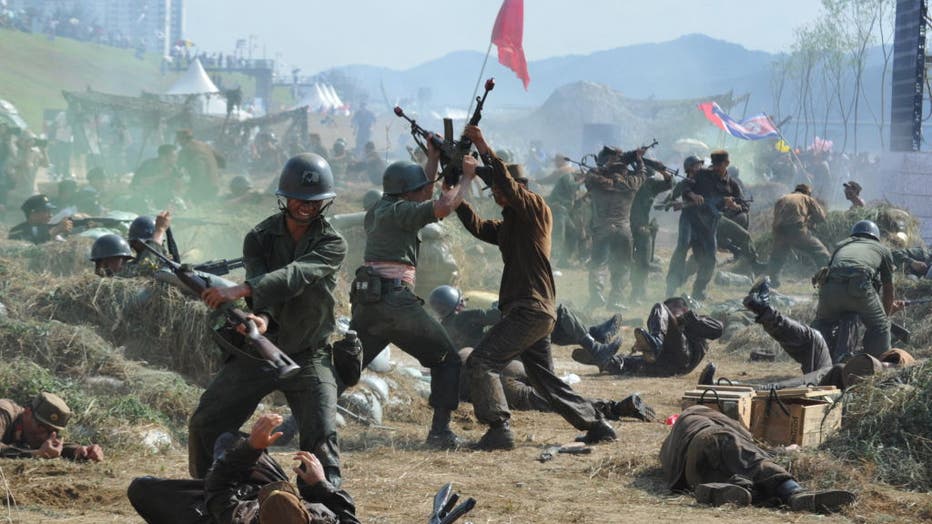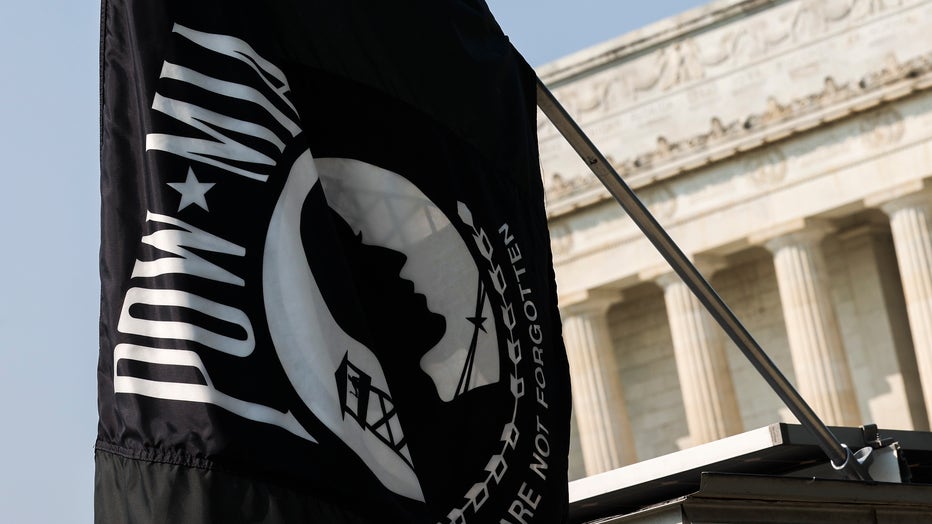Meet the American who won the Medal of Honor and was MIA in Korea for 73 years, Cpl. Luther Herschel Story
AMERICUS, Ga. - U.S. Army Cpl. Luther Herschel Story helped bring light to the Republic of Korea.
The light of freedom, opportunity — actual physical illumination.
The conflict between light and darkness has been a metaphor for the battle of good vs. evil at least since biblical times.
People suffering darkness of spirit, of soul, of opportunity, thirst for the physical, spiritual and intellectual nourishment of light.

Luther H. Story (Courtesy of the Army)
Cpl. Story paid for that gift of light with his life. He's only one of many heroes: Some 37,000 Americans were killed in action in the Korean War (1950-53).
His family paid for that light with the pain of not knowing the fate of their son, brother, uncle, flesh-and-blood.
Cpl. Story was missing in action for 73 years.
"My point of view, God allowed him to do what he had to do and took him home so he didn’t have to do it anymore," Judy Wade, Cpl. Story’s niece, told Fox News Digital in interviews this week.
"That was not his nature. His nature was not to kill people. His nature was to be good to people. He was being good to his fellow soldiers by saving their lives."
The war pitted North Korea and its communist allies against South Korea and the United Nations, namely the United States.
The gift of Cpl. Story’s last full measure of devotion is evident in a satellite photo of the Korean Peninsula at night.
North Korea is an impoverished communist dictatorship ruthlessly ruled by one family for 75 years. It suffers in perpetual darkness.
South Korea is a constitutional republic with a dynamic economy, freedom of thought and expression, and thriving arts that’s gifted the world in recent years global pop music. It is bathed in light.
Families of those Americans killed in Korea need not wonder if their loved ones died in vain.
They brought light to tens of millions of people.
Cpl. Story earned the Medal of Honor for his ferocious last stand in the turning-point battle of the Korean War. He saved lives among his retreating company. He helped save South Korea from darkness.
He was just 18 years old when he sacrificed his life for his fellow man, far from his rural Georgia home.
Cpl. Story's body was unidentified, his resting place unknown, for decades.
Until last month.
Remains at the National Memorial Cemetery of the Pacific in Honolulu, Hawaii, were determined through DNA research by the Defense POW/MIA Accounting Agency (DPAA) to be those of the teenage war hero of two nations.
Wade received the news her uncle was found on April 22. She received his body back home on Wednesday.
Cpl. Story will be buried Monday, Memorial Day, with full military honors at Andersonville National Cemetery.
Story is, as of this week, the most recent American missing in action to be identified and brought home. The search continues for the incredible 81,000 other Americans still missing in action in all wars.
"Cpl. Story is a Korean War hero who sacrificed his noble life in South Korea," Republic of Korea Maj. Gen. Kyungkoo Lee wrote in a statement to Fox News Digital.
Gen. Lee will represent the grateful people of his nation at Cpl. Story’s services on Monday.
He added, "The supreme sacrifice and heroism of Cpl. Luther Story is illustrative of the freedom, security and prosperity the South Korean people have today."
Child of sharecroppers
Luther Herschel Story was born on July 20, 1932, in the rural community of Buena Vista, Georgia to Mark H. and Florence (Holloman) Story.
It was the Great Depression. Luther was the middle of three children between older sister Gwendolyn and younger brother Wilmoth, known as Buddy.
Judy Wade, Gwendolyn’s daughter, was born four years after her uncle went missing in action. But she lived with her grandparents — Luther’s parents — for several years of her youth.
"They were extremely poor. They were sharecroppers," said Wade. "They didn’t call them that then. But they were sharecroppers. They lived in a house on somebody else’s farm. Part of the way they paid them was sharing the crops they got."
She went on, "They raised cotton. My mom talked about it, that her fingers would bleed from picking cotton. Luther was 18 months younger than Mama. He probably picked cotton, too."
Sweet potatoes often served as their only food, three meals a day.
"Luther really liked people," said Wade. "That’s what I always heard when people talked about him. Anybody that knew him knew that he was friendly. He liked everybody. He made friends of strangers. He was just one of those kinds of people."
Her uncle, she said, "has such a great smile."
Story played baseball at Americus High School, not far from where future President Jimmy Carter’s family farmed peanuts in Plains, Georgia. The families knew each other, said Wade.
"He never did graduate because when he was 16 he wanted to join the military," said Wade. "So his mom signed the papers."
The teenage soldier ended up in Korea in 1950 with A Company of the 9th Infantry Regiment, 2nd Infantry Division of the U.S. Army.
He was at the sharp end of a new world divided between dictatorial communism and western democracies — between darkness and light.
Korea was split along the 38th Parallel after World War II: North Korea was under the Soviet Union sphere of influence, and later Communist China; South Korea was under the American sphere of influence.
Tension erupted into warfare when the North Korean army, with foreign communist support, launched a massive sudden surprise attack over the 38th Parallel in June 1950.
South Korean and American forces were quickly overwhelmed, pushed back to the southeastern corner of the Korean Peninsula.
U.S. Army commander Lt. Gen. Walton Walker issued his famous "stand or die" order on July 29, 1950.
"There will be no more retreating, withdrawal or readjustment of the lines or any other term you choose. There is no line behind us to which we can retreat … We must fight until the end ... We will die fighting together … I want everybody to understand we are going to hold this line."
South Korea was on the brink of plunging into perpetual darkness.
Supreme devotion to duty
The heroic Battle of Nakdong River in September 1950 proved the turning point of the Korean War.
Cpl. Story was one of those soldiers determined to follow Gen. Walker’s order and hold the line.
His unit’s situation appeared hopeless, however, on the morning of Sept. 1.
"A savage daylight attack by elements of three enemy divisions penetrated the thinly held lines of the 9th Infantry," reads Story’s Medal of Honor citation.
A teenage private first class at the time of his final battle, Story proved fearless in the face of death. He took over a machine gun from a wounded American and fired on an attacking column, killing or wounding an estimated 100 enemy soldiers.

South Korean soldiers play the roles of South Korean forces and invading North Korean soldiers during a re-enactment of the 1950 battle of Nakdong River(Photo by KIM JAE-HWAN/AFP via Getty Images)
The company commander ordered the unit to withdraw against overwhelming odds.
Story, however, unleashed a barrage of hand grenades on an enemy troop truck towing an ammunition trailer.
"Out of grenades he crawled to his squad, gathered up additional grenades and again attacked the vehicle," the citation reads.
"PFC Story was wounded in this action, but, disregarding his wounds, rallied the men about him and repelled the attack. Realizing that his wounds would hamper his comrades, he refused to retire to the next position but remained to cover the company's withdrawal."
The citation went on, "When last seen, he was firing every weapon available and fighting off another hostile assault."
American and South Korean forces held the line.
They turned the tide of the war later that month there along the Nakdong River. They eventually pushed North Korean and Chinese communist forces back across the 38th Parallel.
The terrible war ended roughly along the 38th Parallel where it began. South Korea was saved as a modern constitutional republic.
The nation and its people have blossomed in the decades since. It has one of the world’s 10 largest economies.
The Battle of Nakdong River is remembered in South Korean history as one of the nation’s most heroic hours.
"The Nakdong perimeter was a tipping point to secure the destiny of Korean and UN forces," Republic of Korea Maj. Gen. Lee said in his statement to Fox News Digital.
"If the Nakdong perimeter was penetrated by the communist army, (South) Korea might have become a Red Korea."
South Koreans now bathe in the light when they were on the verge of being plunged into perpetual darkness.
Cpl. Story is a hero in two nations.
Hero's welcome
Cpl. Story had been listed as missing in action since that day.
"In October 1950, U.S. personnel recovered remains in the area where CPL Story fell, but they could not be identified with the forensic techniques available at the time," reports the Defense POW/MIA Accounting Agency.
The remains were buried among other unknowns at the National Memorial Cemetery of the Pacific in Honolulu, commonly called the Punch Bowl.

The POW/MIA flag flies on the National Mall on September 16, 2022 in Washington, DC. (Photo by Kevin Dietsch/Getty Images)
Story's parents died without knowing his fate. So, too, did his siblings.
His niece, Judy, was the third generation of the Story family left in distress, wondering whatever became of her war hero uncle.
Her mother, Luther’s sister, Gwendolyn, made the decision on her deathbed in 2017 to give a DNA sample to the Department of Defense. So, too, did Judy Wade.
They were compared to a set of remains at the Punch Bowl.
"They were a near-perfect match," Wade said.
She learned on April 22 that her uncle had been found.
She received his remains on May 24.
"It might have been too much for Mommy," said Wade. "She had been so long without him. She always believed that his body was lost, that they couldn’t find his body. It might have been too much for her to handle."
Wade is relieved of a burden that has haunted the Story family for eight decades.
"I don’t have to worry about finding somebody to carry the torch of waiting for him to come home," she said.
Wade was invited to Washington, D.C., to receive the honors of two nations. The entourage that greeted her included several representatives of the Republic of Korea.
"The Korean people love Luther and as his niece they loved me, too," she said. "I could feel they love they had for me. It was palpable."
Wade laid a wreath this month at the Korean War Veterans Memorial, and was greeted by President Biden.
She and her husband, Jody, enjoyed a surprise invite to the Oval Office with the commander-in-chief.
"Our two countries take this joint statement as an opportunity to reaffirm our respect and gratitude for the courageous acts of our service members in defense of our freedom, values and democracy," the White House said last month with the President of Republic of Korea to honor Cpl. Story.
Cpl. Story's parents received the Medal of Honor from Chairman of the Joint Chiefs of Staff Omar Bradley in 1951.
"Someone asked me if my grandma and granddaddy were more proud of him because he was a Medal of Honor recipient or more sad because they couldn’t find his body," said Wade.
"They were more sad because his remains were unidentified. They thought he was lost for good."
Cpl. Luther Herschel Story will earn the tribute of two grateful nations on Memorial Day, finally recognized with a hero’s return his parents and siblings never got to witness.
Cpl. Story helped bring light to a world at constant war with darkness.
He has always been a hero to me," said Wade.
She added, "I feel he’s with me right now … I really feel that he is with me and helping me do this for him, to share his story. I believe he belongs to anyone who wants him. He’s not just mine. There is just no other way for me to put it."
Get the latest updates to this story on FoxNews.com

